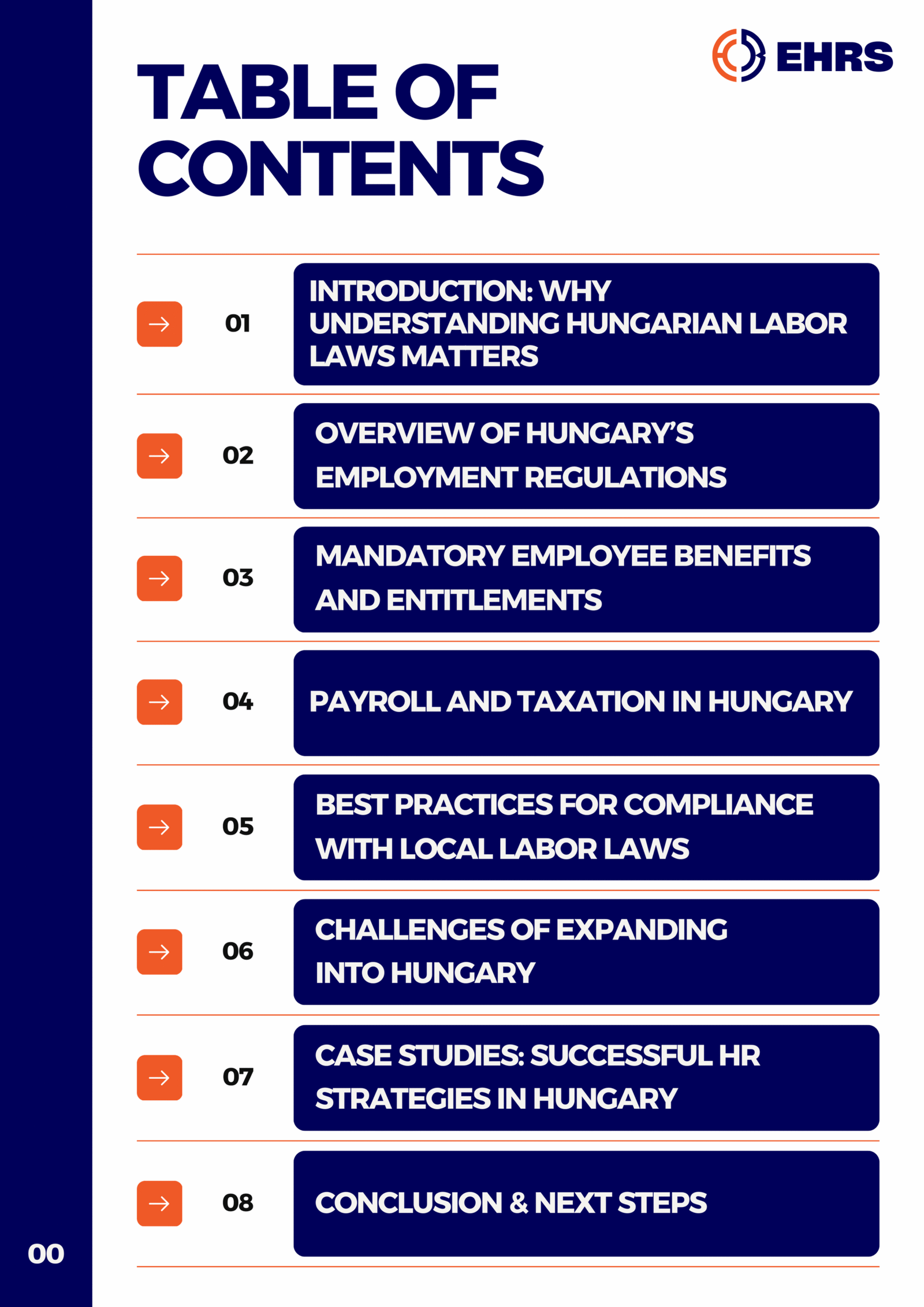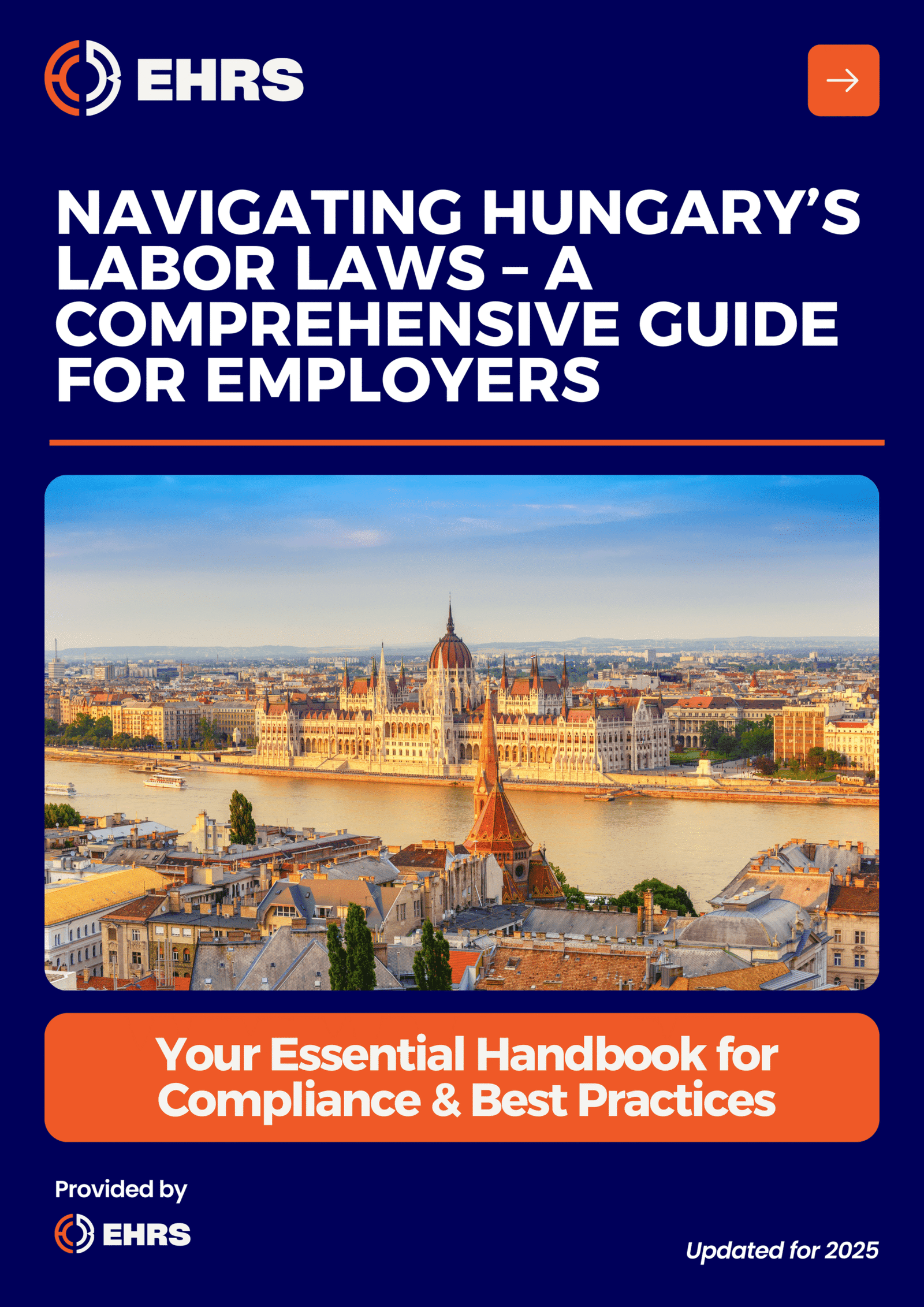HUNGARY
List of countries
HR Services for Hungary
According to the U.S. Department of State, Hungary remains a strategic investment destination in Central Europe, offering competitive labor costs, a strong industrial base, and EU market access. With robust infrastructure and a central location, Hungary serves as a regional hub for manufacturing, automotive, logistics, and shared service operations. The Hungarian government continues to promote foreign investment through favorable tax policies and simplified corporate procedures. U.S. companies are active across key sectors, contributing to job creation and trade growth.
However, HR operations in Hungary can present challenges for U.S. and UK companies unfamiliar with the local labor code, language-specific documentation, and evolving regulatory expectations. Employment contracts must be in Hungarian and follow strict content guidelines. Employers must also comply with rules around probation periods, paid leave, working hours, and social security contributions. Managing these requirements internally can increase the risk of compliance gaps and administrative delays. By outsourcing HR to a local expert like EHRS, businesses can streamline market entry, ensure legal compliance, and manage payroll, contracts, and employee documentation in full alignment with Hungarian and EU labor law.
ALL YOU NEED TO KNOW ABOUT
HR OUTSOURCING IN HUNGARY
HUNGARIAN EMPLOYMENT
REGULATIONS TO KNOW
THE BENEFITS OF
EXPANSION IN HUNGARY
THE CHALLENGES OF
EXPANSION IN HUNGARY

Check our free HR guide to help you quickly improve your HR in Hungary
FAQ for Hungary
Free Download
Request your free guide and receive it immediately

All You Need to Know About Outsourcing
Your HR in Hungary with EHRS
Comprehensive HR Outsourcing Support
EHRS provides full-service HR management in Hungary, covering employment contracts, payroll, leave management, and local compliance. We help you set up operations smoothly while staying fully aligned with Hungarian labor law and EU standards.
Expert Navigation of Hungarian Labor Law
Hungarian labor law includes specific regulations on employment types, probation periods, and working time arrangements. EHRS ensures your employment practices meet legal standards, minimizing risks and ensuring business continuity.
Scalable and Cost-Effective HR Solutions
Setting up an internal HR team can be time-consuming and expensive. EHRS offers flexible HR support tailored to the size and needs of your business—ideal for startups, SMEs, and multinational firms entering the Hungarian market.
Hungarian Employment Regulations to Know
Employment Contracts
All employment relationships in Hungary must be formalized with written contracts in Hungarian. Contracts must specify the job role, base salary, place of work, and probation period, and must comply with the Hungarian Labor Code.
Working Hours & Leave
The standard workweek is 40 hours. Employees are entitled to a minimum of 20 working days of paid annual leave, which increases with age and seniority. Additional rules apply to overtime and flexible working arrangements.
Social Security & Tax Contributions
Employers are required to contribute to Hungary’s social security system, covering pensions, healthcare, and unemployment. They must also register employees with the tax authority and make monthly payroll declarations.
The Benefits of Expansion in Hungary
Strategic Central European Location
Hungary’s central location offers direct access to key EU markets including Austria, Germany, Romania, and Slovakia—making it an excellent logistics and manufacturing hub.
Competitive Labor Costs
Hungary offers a highly skilled workforce at relatively low labor costs compared to Western Europe. This makes it a cost-effective location for service centers, IT hubs, and industrial operations.
Pro-Business Reforms & EU Access
The Hungarian government has introduced tax incentives and simplified corporate procedures to attract foreign investors. EU membership ensures regulatory alignment and access to the single market.
The Challenges of Expansion in Hungary
Complex Labor Law Interpretation
Although the Hungarian Labor Code is relatively business-friendly, interpretation of its provisions—especially concerning dismissal, working hours, and remote work—can be complex and context-dependent.
Language and Documentation Requirements
Employment contracts and official HR documentation must be in Hungarian. Accurate legal translation and cultural adaptation are essential for compliance and employee understanding.
Bureaucratic Procedures
Despite improvements in digital services, administrative requirements such as registration with local tax and social insurance authorities can be time-consuming. A local HR partner can help ensure accuracy and efficiency.



